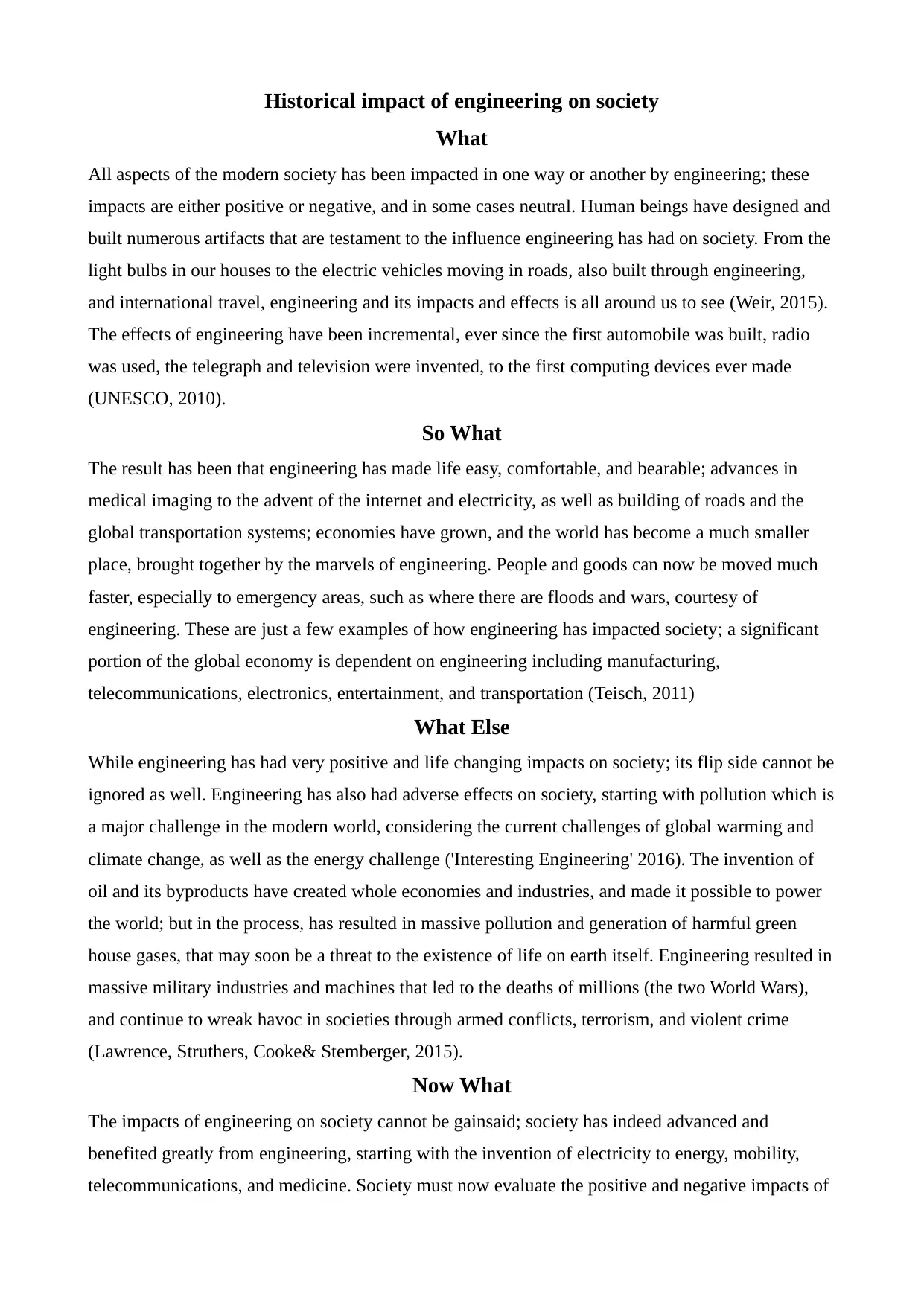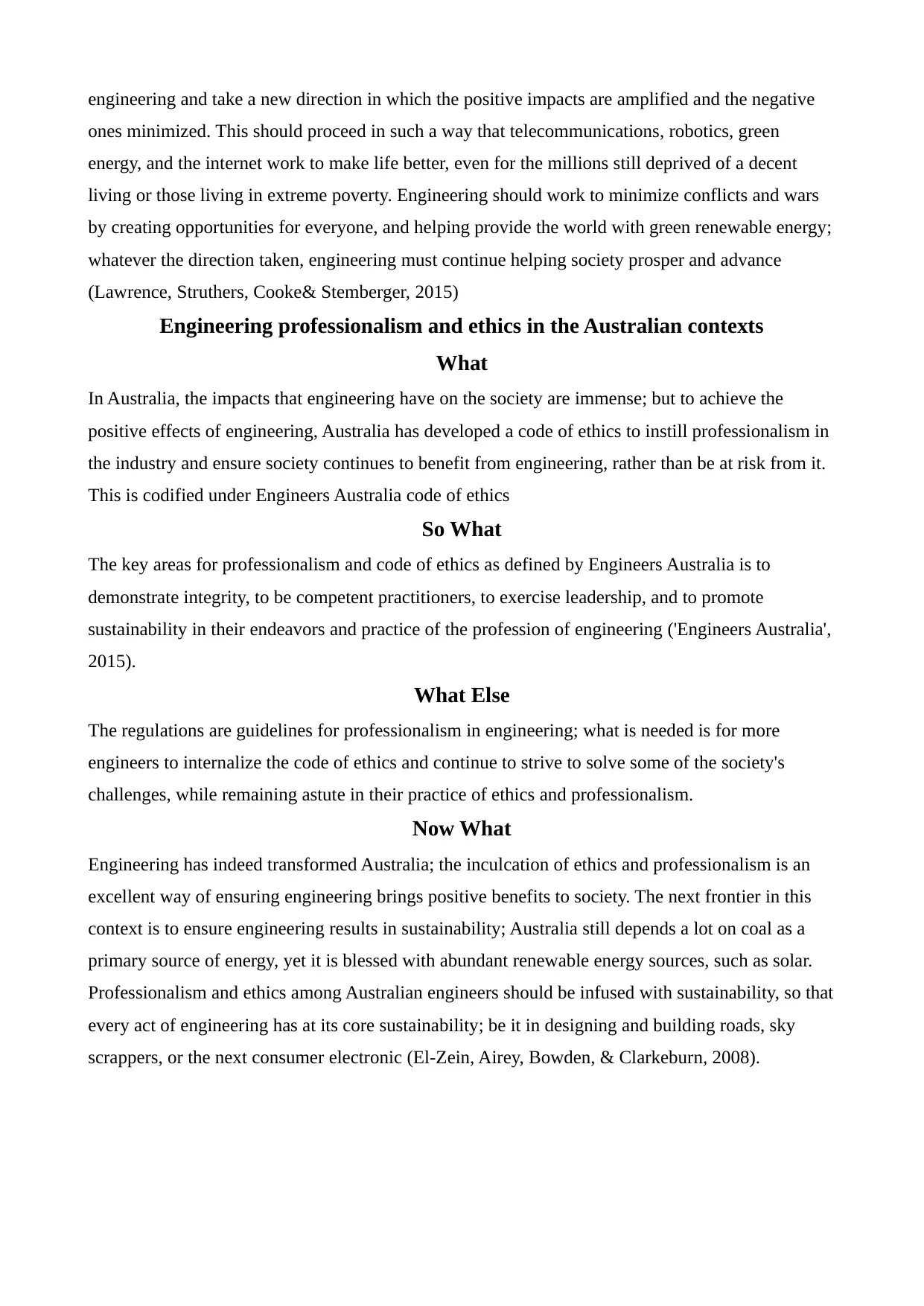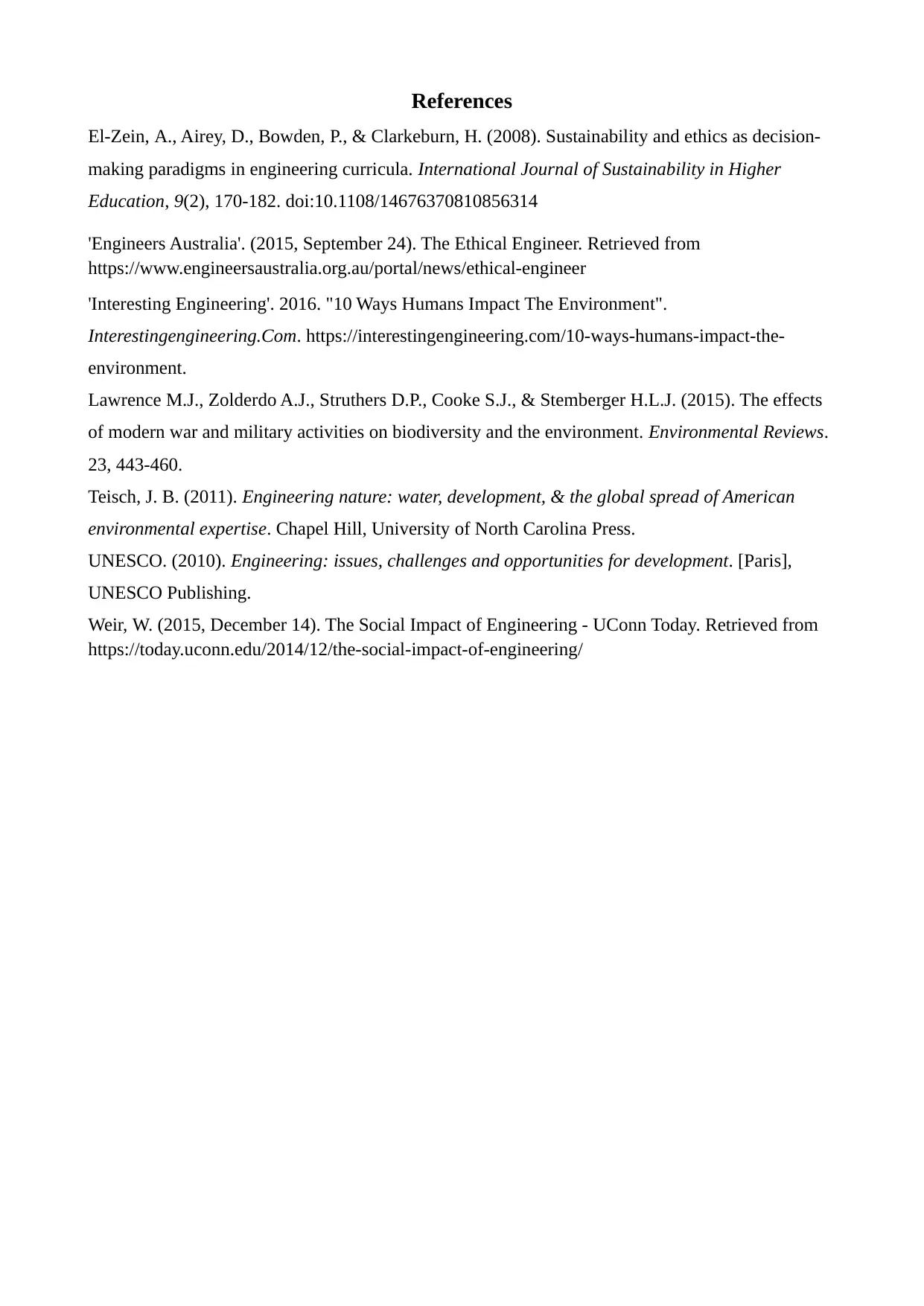Impact of Engineering on Society, Ethics in Australia
VerifiedAdded on 2021/05/27
|4
|1118
|66
Essay
AI Summary
This essay provides a comprehensive overview of the historical impact of engineering on society, highlighting both its positive and negative effects. It explores how engineering has transformed various aspects of modern life, from transportation and communication to medicine and energy. The essay also delves into the ethical considerations within the field, particularly within the Australian context, referencing the Engineers Australia code of ethics and emphasizing the importance of professionalism and sustainability. It discusses the need to balance technological advancements with environmental concerns and social responsibility, advocating for engineering practices that prioritize sustainability and contribute to a better future. The essay concludes by emphasizing the need for engineers to consider the broader impacts of their work and to strive for solutions that benefit society as a whole.

AUSTRALIAN ENGINEERING PRACTICE
NAME
DATE
NAME
DATE
Paraphrase This Document
Need a fresh take? Get an instant paraphrase of this document with our AI Paraphraser

Historical impact of engineering on society
What
All aspects of the modern society has been impacted in one way or another by engineering; these
impacts are either positive or negative, and in some cases neutral. Human beings have designed and
built numerous artifacts that are testament to the influence engineering has had on society. From the
light bulbs in our houses to the electric vehicles moving in roads, also built through engineering,
and international travel, engineering and its impacts and effects is all around us to see (Weir, 2015).
The effects of engineering have been incremental, ever since the first automobile was built, radio
was used, the telegraph and television were invented, to the first computing devices ever made
(UNESCO, 2010).
So What
The result has been that engineering has made life easy, comfortable, and bearable; advances in
medical imaging to the advent of the internet and electricity, as well as building of roads and the
global transportation systems; economies have grown, and the world has become a much smaller
place, brought together by the marvels of engineering. People and goods can now be moved much
faster, especially to emergency areas, such as where there are floods and wars, courtesy of
engineering. These are just a few examples of how engineering has impacted society; a significant
portion of the global economy is dependent on engineering including manufacturing,
telecommunications, electronics, entertainment, and transportation (Teisch, 2011)
What Else
While engineering has had very positive and life changing impacts on society; its flip side cannot be
ignored as well. Engineering has also had adverse effects on society, starting with pollution which is
a major challenge in the modern world, considering the current challenges of global warming and
climate change, as well as the energy challenge ('Interesting Engineering' 2016). The invention of
oil and its byproducts have created whole economies and industries, and made it possible to power
the world; but in the process, has resulted in massive pollution and generation of harmful green
house gases, that may soon be a threat to the existence of life on earth itself. Engineering resulted in
massive military industries and machines that led to the deaths of millions (the two World Wars),
and continue to wreak havoc in societies through armed conflicts, terrorism, and violent crime
(Lawrence, Struthers, Cooke& Stemberger, 2015).
Now What
The impacts of engineering on society cannot be gainsaid; society has indeed advanced and
benefited greatly from engineering, starting with the invention of electricity to energy, mobility,
telecommunications, and medicine. Society must now evaluate the positive and negative impacts of
What
All aspects of the modern society has been impacted in one way or another by engineering; these
impacts are either positive or negative, and in some cases neutral. Human beings have designed and
built numerous artifacts that are testament to the influence engineering has had on society. From the
light bulbs in our houses to the electric vehicles moving in roads, also built through engineering,
and international travel, engineering and its impacts and effects is all around us to see (Weir, 2015).
The effects of engineering have been incremental, ever since the first automobile was built, radio
was used, the telegraph and television were invented, to the first computing devices ever made
(UNESCO, 2010).
So What
The result has been that engineering has made life easy, comfortable, and bearable; advances in
medical imaging to the advent of the internet and electricity, as well as building of roads and the
global transportation systems; economies have grown, and the world has become a much smaller
place, brought together by the marvels of engineering. People and goods can now be moved much
faster, especially to emergency areas, such as where there are floods and wars, courtesy of
engineering. These are just a few examples of how engineering has impacted society; a significant
portion of the global economy is dependent on engineering including manufacturing,
telecommunications, electronics, entertainment, and transportation (Teisch, 2011)
What Else
While engineering has had very positive and life changing impacts on society; its flip side cannot be
ignored as well. Engineering has also had adverse effects on society, starting with pollution which is
a major challenge in the modern world, considering the current challenges of global warming and
climate change, as well as the energy challenge ('Interesting Engineering' 2016). The invention of
oil and its byproducts have created whole economies and industries, and made it possible to power
the world; but in the process, has resulted in massive pollution and generation of harmful green
house gases, that may soon be a threat to the existence of life on earth itself. Engineering resulted in
massive military industries and machines that led to the deaths of millions (the two World Wars),
and continue to wreak havoc in societies through armed conflicts, terrorism, and violent crime
(Lawrence, Struthers, Cooke& Stemberger, 2015).
Now What
The impacts of engineering on society cannot be gainsaid; society has indeed advanced and
benefited greatly from engineering, starting with the invention of electricity to energy, mobility,
telecommunications, and medicine. Society must now evaluate the positive and negative impacts of

engineering and take a new direction in which the positive impacts are amplified and the negative
ones minimized. This should proceed in such a way that telecommunications, robotics, green
energy, and the internet work to make life better, even for the millions still deprived of a decent
living or those living in extreme poverty. Engineering should work to minimize conflicts and wars
by creating opportunities for everyone, and helping provide the world with green renewable energy;
whatever the direction taken, engineering must continue helping society prosper and advance
(Lawrence, Struthers, Cooke& Stemberger, 2015)
Engineering professionalism and ethics in the Australian contexts
What
In Australia, the impacts that engineering have on the society are immense; but to achieve the
positive effects of engineering, Australia has developed a code of ethics to instill professionalism in
the industry and ensure society continues to benefit from engineering, rather than be at risk from it.
This is codified under Engineers Australia code of ethics
So What
The key areas for professionalism and code of ethics as defined by Engineers Australia is to
demonstrate integrity, to be competent practitioners, to exercise leadership, and to promote
sustainability in their endeavors and practice of the profession of engineering ('Engineers Australia',
2015).
What Else
The regulations are guidelines for professionalism in engineering; what is needed is for more
engineers to internalize the code of ethics and continue to strive to solve some of the society's
challenges, while remaining astute in their practice of ethics and professionalism.
Now What
Engineering has indeed transformed Australia; the inculcation of ethics and professionalism is an
excellent way of ensuring engineering brings positive benefits to society. The next frontier in this
context is to ensure engineering results in sustainability; Australia still depends a lot on coal as a
primary source of energy, yet it is blessed with abundant renewable energy sources, such as solar.
Professionalism and ethics among Australian engineers should be infused with sustainability, so that
every act of engineering has at its core sustainability; be it in designing and building roads, sky
scrappers, or the next consumer electronic (El‐Zein, Airey, Bowden, & Clarkeburn, 2008).
ones minimized. This should proceed in such a way that telecommunications, robotics, green
energy, and the internet work to make life better, even for the millions still deprived of a decent
living or those living in extreme poverty. Engineering should work to minimize conflicts and wars
by creating opportunities for everyone, and helping provide the world with green renewable energy;
whatever the direction taken, engineering must continue helping society prosper and advance
(Lawrence, Struthers, Cooke& Stemberger, 2015)
Engineering professionalism and ethics in the Australian contexts
What
In Australia, the impacts that engineering have on the society are immense; but to achieve the
positive effects of engineering, Australia has developed a code of ethics to instill professionalism in
the industry and ensure society continues to benefit from engineering, rather than be at risk from it.
This is codified under Engineers Australia code of ethics
So What
The key areas for professionalism and code of ethics as defined by Engineers Australia is to
demonstrate integrity, to be competent practitioners, to exercise leadership, and to promote
sustainability in their endeavors and practice of the profession of engineering ('Engineers Australia',
2015).
What Else
The regulations are guidelines for professionalism in engineering; what is needed is for more
engineers to internalize the code of ethics and continue to strive to solve some of the society's
challenges, while remaining astute in their practice of ethics and professionalism.
Now What
Engineering has indeed transformed Australia; the inculcation of ethics and professionalism is an
excellent way of ensuring engineering brings positive benefits to society. The next frontier in this
context is to ensure engineering results in sustainability; Australia still depends a lot on coal as a
primary source of energy, yet it is blessed with abundant renewable energy sources, such as solar.
Professionalism and ethics among Australian engineers should be infused with sustainability, so that
every act of engineering has at its core sustainability; be it in designing and building roads, sky
scrappers, or the next consumer electronic (El‐Zein, Airey, Bowden, & Clarkeburn, 2008).
⊘ This is a preview!⊘
Do you want full access?
Subscribe today to unlock all pages.

Trusted by 1+ million students worldwide

References
El‐Zein, A., Airey, D., Bowden, P., & Clarkeburn, H. (2008). Sustainability and ethics as decision‐
making paradigms in engineering curricula. International Journal of Sustainability in Higher
Education, 9(2), 170-182. doi:10.1108/14676370810856314
'Engineers Australia'. (2015, September 24). The Ethical Engineer. Retrieved from
https://www.engineersaustralia.org.au/portal/news/ethical-engineer
'Interesting Engineering'. 2016. "10 Ways Humans Impact The Environment".
Interestingengineering.Com. https://interestingengineering.com/10-ways-humans-impact-the-
environment.
Lawrence M.J., Zolderdo A.J., Struthers D.P., Cooke S.J., & Stemberger H.L.J. (2015). The effects
of modern war and military activities on biodiversity and the environment. Environmental Reviews.
23, 443-460.
Teisch, J. B. (2011). Engineering nature: water, development, & the global spread of American
environmental expertise. Chapel Hill, University of North Carolina Press.
UNESCO. (2010). Engineering: issues, challenges and opportunities for development. [Paris],
UNESCO Publishing.
Weir, W. (2015, December 14). The Social Impact of Engineering - UConn Today. Retrieved from
https://today.uconn.edu/2014/12/the-social-impact-of-engineering/
El‐Zein, A., Airey, D., Bowden, P., & Clarkeburn, H. (2008). Sustainability and ethics as decision‐
making paradigms in engineering curricula. International Journal of Sustainability in Higher
Education, 9(2), 170-182. doi:10.1108/14676370810856314
'Engineers Australia'. (2015, September 24). The Ethical Engineer. Retrieved from
https://www.engineersaustralia.org.au/portal/news/ethical-engineer
'Interesting Engineering'. 2016. "10 Ways Humans Impact The Environment".
Interestingengineering.Com. https://interestingengineering.com/10-ways-humans-impact-the-
environment.
Lawrence M.J., Zolderdo A.J., Struthers D.P., Cooke S.J., & Stemberger H.L.J. (2015). The effects
of modern war and military activities on biodiversity and the environment. Environmental Reviews.
23, 443-460.
Teisch, J. B. (2011). Engineering nature: water, development, & the global spread of American
environmental expertise. Chapel Hill, University of North Carolina Press.
UNESCO. (2010). Engineering: issues, challenges and opportunities for development. [Paris],
UNESCO Publishing.
Weir, W. (2015, December 14). The Social Impact of Engineering - UConn Today. Retrieved from
https://today.uconn.edu/2014/12/the-social-impact-of-engineering/
1 out of 4
Related Documents
Your All-in-One AI-Powered Toolkit for Academic Success.
+13062052269
info@desklib.com
Available 24*7 on WhatsApp / Email
![[object Object]](/_next/static/media/star-bottom.7253800d.svg)
Unlock your academic potential
Copyright © 2020–2026 A2Z Services. All Rights Reserved. Developed and managed by ZUCOL.





